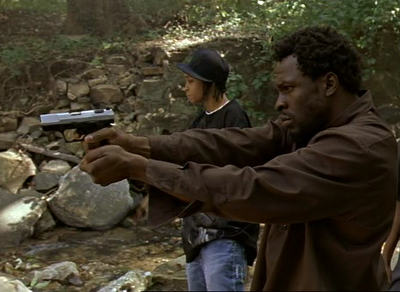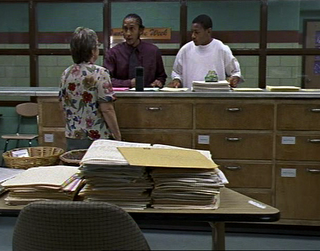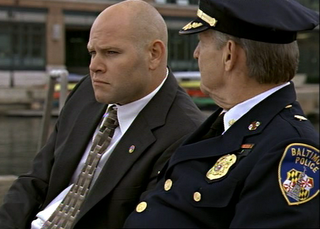Monday, September 18, 2006
The Wire No. 39: Soft Eyes
BLOGGER'S NOTE: As always, know that spoilers lie below, so don't venture further unless you've seen the episode or don't care if you know what happens.


By Edward Copeland
Season 4's education theme really starts to take hold in the second episode, though in this instance its focus is more on the roles of mentors, both good and bad, than on the learning itself. Again, The Wire looks mostly at the young teens we met in last week's episode. We learn that Namond not only works as a runner for Bodie, he's the son of the incarcerated Wee-Bey (Hassan Johnson), the former Barksdale soldier who went to jail for his part in shooting Kima in Season 1 — and Wee-Bey still obsesses about the care and feeding of his fish. As far as fatherly concern goes, his preoccupation during Namond and his mother's prison visit is that Namond is doing right by Bodie and providing income for his mom since dad is out of pocket.

We learn more about Michael, who is a budding boxer under the tutelage of Cutty (Chad L. Coleman) and has primary responsibility for caring for his younger sibling. Randy remains under the watchful eye of his foster mother. Dukie turns out to be living with a family of junkies. We also meet a fifth teenager — Sherrod (Rashad Orange), a homeless teen that Bubbles (Andre Royo) has taken under his wing — even going so far as to re-enroll him in school pretending he's Sherrod's uncle. Marlo also is making an effort to woo the teens, handing out big wads of cash to them for back-to-school clothes as if he were Hezbollah dumping dollars on Lebanese citizens shelled out of their homes. Michael, however, refuses to take Marlo's money, prompting a tense scene that ends up implying that Marlo respects the lad for turning his nose up at his cash. The other teens have no problem grabbing Marlo's cash. As Namond says, "I'll take any motherfucker's money if he's giving it away," a line that is echoed nearly verbatim when a furious state Sen. Clay Davis (Isiah Whitlock Jr.) goes ballistic when he's served with a subpoena questioning his financial ties to the late Stringer Bell. Davis complains to Mayor Royce, who pressures Burrell to clamp down on the Major Crimes Unit from which the subpoenas came.
Assistant State's Attorney Pearlman finally gets wise that Lester's timing for the subpoenas was no accident — he knew that with election concerns looming over everyone's heads, this was the only time they could get away with serving them without the bosses coming down on them. The bosses are still coming though — with Rawls (John Doman) suggesting to Burrell that MCU needs better supervision.

Royce also opens the show when Herc, assigned to his security detail, walks in on the mayor getting a blow job, prompting Herc to wonder if his days are numbered and seeking advice from his former partner Sgt. Carver, who steers him to a department veteran — Major Valchek (Al Brown). The transformation of Valchek's character has been one of the most fascinating in the history of The Wire. Valchek started out as a minor character, best known for protecting his son-in-law, Prez. Then, in Season 2, Valchek became a petty bureaucrat who launched a vendetta against dock union leader Frank Sobotka (Chris Bauer) over a donation to a church. Beginning in Season 3 and especially this year, Valchek has become a player and a sage, becoming almost like Yoda to Herc about what he saw and giving help to Carcetti.
Carcetti still finds himself depressed over dismal poll numbers, but thanks to a tip from Valchek via, unexpectedly, Sgt. Landesman (Delaney Williams), he manages to score big points in a debate against Royce, though it's unclear who actually is watching. Speaking of Valchek's son-in-law, Prez still is getting orientation tips from other teachers before the school year begins, advising him to keep the students busy because distractions prevent disorder.
Tweet
Labels: David Simon, HBO, The Wire, TV Recap
Comments:
<< Home
The evolution of Valchek has been one of the most surprising, confounding and satisfying developments among the minor players. Without ever neutralizing his overpowering assholishness, Simon and company really explain how a guy like that -- petty, self-interested, a total non-visionary -- could survive and thrive, not just in the police department, but conceivably under almost any circumstances. His front-and-center selfishness is truly frightening. And yet he's believable as a mentor figure, because when you're down (as Carcetti is in this episode) you'll take a hand up from anyone who offers.
Post a Comment
<< Home

